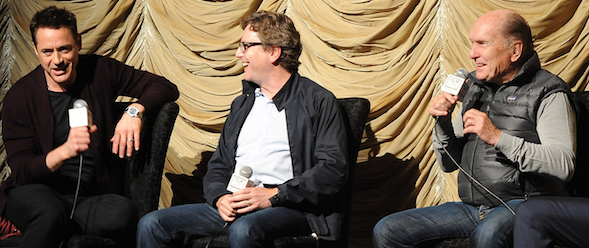“You Talk. You Listen.” Robert Duvall Sums Up Acting at Film Independent at LACMA

Even the way he squared off on the chair on stage before a packed house, knees forward, back straight, was a testament to Robert Duvall’s no-bullshit aura.
Following last night’s Film Independent at LACMA screening of The Judge, Duvall and co-star Robert Downey, Jr. were greeted by a standing ovation at the Bing Theater at LACMA, where the celebrated actor’s blunt, fear-no-consequences remarks during the Q&A charmed the crowd and stole the night.
Duvall, on The Judge’s writer: “All he did was come and sit and stand around on set and look like he was lost. He asked me ‘What was it like to be in the The Godfather? What was it like to be in Lonesome Dove?’ That’s all he had to say. He looked lost, but he wrote such a beautiful script.”
On method acting: “Like somebody said, ‘Some of these method actors come on [set] with a big bag of yesterday.'”
On researching the role: “People say, ‘what do you do for research?’ I say, ‘I don’t do anything. I’m an actor. I just jumped in and did it.’”
On working with actors: “I’m actually big on the old school, like everybody.” Laughing, Duvall gave an example: “This director in a movie said to an actor, ‘When I say action, tense up goddamn it!'”
On Downey: “I like his shoes. He has great shoes. Different kinds every day.” (Sure enough, Downey, on stage with The Judge director David Dobkin and Film Independent curator Elvis Mitchell, was sporting flashy Tom Ford lace-ups from his famously showy collection.)
Spoiler alert! – The Judge revolves around Duvall’s character, a small-town judge who ends up on the other side of the bench when he’s accused of killing a local lowlife by running him down with his car. The victim was a murderer he had long ago allowed to walk—a life-long regret. Downey plays his son, a high-powered, quick-witted lawyer who’s still struggling to win his father’s approval and ends up defending him in court. Billy Bob Thornton, Vera Farminga, Vincent D’Onofrio, Dax Shepard and Leighton Meester round out the ensemble cast.
Despite the pair’s obvious chemistry, Duvall confessed that the first time they met was when Downey appeared at his table at Taverna Tony restaurant in Malibu. “He came up to me and introduced himself and walked away, and I didn’t know who that was,”—until his wife told him, he said, laughing. Duvall said Downey handled it with grace. “He’s a gracious guy. Very gifted, very democratic.” (In his version of the story Downey said, “I went over to pay my respects to this great American actor. I said, ‘Mr. Duvall….’ He said, ‘Yeah?’ He looked at me like I was going to get him his food to-go or something.”
Duvall said he was drawn to The Judge due to its “smart material, smart script”—though he admitted that he first turned the project down and later changed his mind—surprisingly Duvall revealed he had done the exact same thing with The Great Santini. “Sometimes when you reconsider, it turns out better,” said Duvall. “You have doubts and you have to commit. So once you commit, you commit.”
Duvall also was grateful for the rare opportunity to be a part of the kind of movie Hollywood doesn’t make anymore, a high-budget studio drama. “We had 60 days to do it, usually you have 23,” Duvall said. “They used to be made in the system in the ‘70s. They say they don’t make these kind of movies any more, but they do, in independent film,” he said. Duvall noted, “This may be the biggest movie I’ve done since Apocalypse Now—way back, way back.”
Another rare luxury was the three-week rehearsal period, though Duvall expressed reservations about devoting excess time to character development. “Some of that you try to figure out on the day,” he said. “You don’t want to think about it too much.”
Downey and Dobkin had no shortage of stories about the way Duvall’s frank style permeated the rehearsal and production process on set. Downey described the first day of shooting and first thinking that Duvall was “not doing anything, he’s just warming up” then later looking at the monitor and realizing that Duvall was doing “extremely subtle things to move the scene forward.” Downey said he was always trying to follow Duvall’s lead, particularly when it came to taking a restrained approach to scenes with emotional depth. “Bobby would always say, ‘When you watch a documentary about a person who’s talking about a death in their family or something that’s unconscionable to them, they aren’t just weeping like it’s their close-up. They’re sitting on it, and trying not to feel it. Why don’t we just do that?’ And I was like, ‘Goddamn. ‘Cause I like to cry a little bit if I’ve got a close-up,'” Downey joked.
“I know some people who are talented, but…like for people to listen to them talk about the process, ” said Downey. “It’s typical. I can be one of those people sometimes.” Bobby’s like, [Downey imitated Duvall’s gruff, short delivery] ‘We just do it. Talking and listening.’”
Duvall, being Duvall, didn’t miss a beat. “What else is there?”
Pamela Miller / Website & Grants Manager